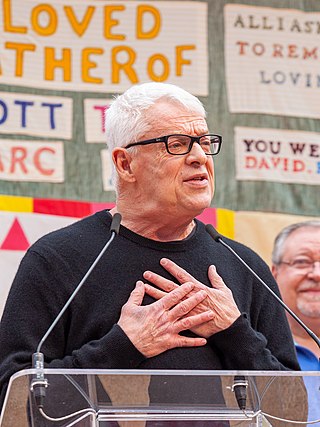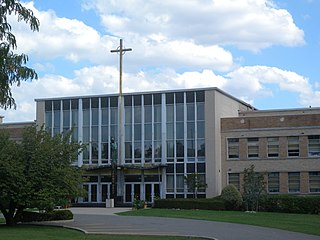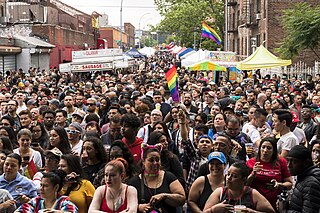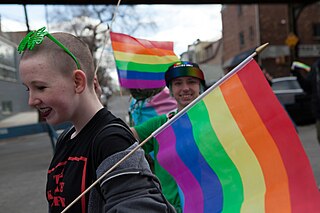Related Research Articles

Lesbian, gay, bisexual, transgender and queer (LGBTQ) movements are social movements that advocate for LGBTQ people in society. Although there is not a primary or an overarching central organization that represents all LGBTQ people and their interests, numerous LGBTQ rights organizations are active worldwide. The first organization to promote LGBTQ rights was the Scientific-Humanitarian Committee, founded in 1897 in Berlin.

The LGBTQ community is a loosely defined grouping of lesbian, gay, bisexual, transgender, and queer or questioning individuals united by a common culture and social movements. These communities generally celebrate pride, diversity, individuality, and sexuality. LGBTQ activists and sociologists see LGBTQ community-building as a counterweight to heterosexism, homophobia, biphobia, transphobia, sexualism, and conformist pressures that exist in the larger society. The term pride or sometimes gay pride expresses the LGBTQ community's identity and collective strength; pride parades provide both a prime example of the use and a demonstration of the general meaning of the term. The LGBTQ community is diverse in political affiliation. Not all people who are lesbian, gay, bisexual, or transgender consider themselves part of the LGBTQ community.
Anti-LGBTQ rhetoric comprises themes, catchphrases, and slogans that have been used in order to demean lesbian, gay, bisexual, transgender, and queer (LGBTQ) people. Anti-LGBTQ rhetoric is widely considered a form of hate speech, which is illegal in countries such as the Netherlands, Norway, and Sweden.

A straight ally, heterosexual ally, cisgender ally, or cis ally is a heterosexual and cisgender person who supports equal civil rights, gender equality, and LGBTQ+ social movements. Individuals may meet this designation through their actions without actively identifying as an ally.

Cleve Jones is an American AIDS and LGBT rights activist. He conceived the NAMES Project AIDS Memorial Quilt, which has become, at 54 tons, the world's largest piece of community folk art as of 2020. In 1983 at the onset of the AIDS pandemic, Jones co-founded the San Francisco AIDS Foundation, which has grown into one of the largest and most influential advocacy organizations empowering people with AIDS in the United States.

St. John's Preparatory School is a private, Roman Catholic high school in the Astoria neighborhood of Queens, New York City, New York. It is located within the Roman Catholic Diocese of Brooklyn.

Pride is the promotion of the rights, self-affirmation, dignity, equality, and increased visibility of lesbian, gay, bisexual, transgender and queer (LGBTQ) people as a social group. Pride, as opposed to shame and social stigma, is the predominant outlook that bolsters most LGBTQ rights movements. Pride has lent its name to LGBTQ-themed organizations, institutes, foundations, book titles, periodicals, a cable TV channel, and the Pride Library.
LGBTQ rights organizations are non-governmental civil rights, health, and community organizations that promote the civil and human rights and health of sexual minorities, and to improve the LGBTQ community.
Pedro Julio Serrano is a human rights activist. He is the president of the LGBTQ+ Federation of Puerto Rico and currently works as director of development and public policy at Waves Ahead. Serrano is also the president of Puerto Rico Para Todes, a non-profit LGBTQ+ and social justice advocacy organization he founded in 2003. He is a former advisor to former New York City Council Speaker Melissa Mark Viverito and former San Juan Mayor Carmen Yulín Cruz. Serrano also served as executive director of Programa Vida and Clínica Transalud of the Municipality of San Juan. He made history as the first openly LGBTQ+ political candidate in Puerto Rican history.

In the United States, lesbian, gay, bisexual, transgender and queer (LGBTQ) people have a long history, including vibrant subcultures and advocacy battles for social and religious acceptance and legal rights.

Historically speaking, lesbian, gay, bisexual, transgender and queer (LGBTQ) people have not been given equal treatment and rights by both governmental actions and society's general opinion. Much of the intolerance for LGBTQ individuals come from lack of education around the LGBTQ community, and contributes to the stigma that results in same-sex marriage being legal in few countries (31) and persistence of discrimination, such as in the workplace.
New York has a long history of LGBTQ community building, activism, and culture which extends to the early history of the city.

New York City has been described as the gay capital of the world and the central node of the LGBTQ+ sociopolitical ecosystem, and is home to one of the world's largest and most prominent LGBTQ+ populations. Brian Silverman, the author of Frommer's New York City from $90 a Day, wrote the city has "one of the world's largest, loudest, and most powerful LGBT communities", and "Gay and lesbian culture is as much a part of New York's basic identity as yellow cabs, high-rise buildings, and Broadway theatre". LGBT travel guide Queer in the World states, "The fabulosity of Gay New York is unrivaled on Earth, and queer culture seeps into every corner of its five boroughs". LGBTQ advocate and entertainer Madonna stated metaphorically, "Anyways, not only is New York City the best place in the world because of the queer people here. Let me tell you something, if you can make it here, then you must be queer."
The LGBTQ community in Chicago is one of the United States' most prominent, especially within the Midwest, alongside those of San Francisco and New York City, and holds a significant role in the progression of gay rights in the country. With a population of around 3 million, Chicago is the third biggest city in the US, and around 150,000 of those people identify as lesbian, bisexual, gay, transgender, questioning, or other.

The following outline offers an overview and guide to LGBTQ topics:
Austin, Texas, has one of the most prominent and active LGBT populations in the United States. Austin was acclaimed by The Advocate in 2012 as part of its Gayest Cities in America, and was recognized by Travel and Leisure as one of America's Best Cities for Gay Travel. Much of Austin's gay nightlife scene is clustered around 4th Street. LGBT activism groups Atticus Circle and Equality Texas are headquartered in Austin.

The Queens Pride Parade and Multicultural Festival is the second oldest and second-largest pride parade in New York City. It is held annually in the neighborhood of Jackson Heights, located in the New York City borough of Queens. The parade was founded by Daniel Dromm and Maritza Martinez to raise the visibility of the LGBTQ community in Queens and memorialize Jackson Heights resident Julio Rivera. Queens also serves as the largest transgender hub in the Western hemisphere and is the most ethnically diverse urban area in the world.
The National LGBTQ Wall of Honor is a memorial wall in the Greenwich Village neighborhood of Manhattan in New York City, dedicated to LGBTQ "pioneers, trailblazers, and heroes". Located inside the Stonewall Inn, the wall is part of the Stonewall National Monument, the first U.S. National Monument dedicated to the country's LGBTQ rights and history. The first fifty inductees were unveiled June 27, 2019, as a part of events marking the 50th anniversary of Stonewall. Five honorees are added annually.

The St. Pat's for All Parade is an annual event that honors Irish culture and promotes inclusivity. It was established on March 5, 2000, and takes place in the Sunnyside and Woodside neighborhoods of Queens, New York City, which traditionally have been home to Irish New Yorkers. The parade was initiated by Brendan Fay, a gay Irish immigrant, in response to the exclusion of LGBTQ+ groups like the Irish Lesbian and Gay Organization from the New York City St. Patrick's Day Parade in Manhattan. Fay's objective is to celebrate the diversity of New York City, guided by the motto "Cherishing All the Children of the Nation Equally," which originates from the Proclamation of the Irish Republic during the Easter Rising of 1916. The most recent parade occurred on March 5, 2023.
References
- ↑ HIV/AIDS - Symptoms and causes - Mayo Clinic
- 1 2 3 Dorgan, Michael (May 2, 2022). "Astoria Street Co-Named in Honor of Prominent Local Family Who Fought for LGBT Rights". Astoria Post.
- 1 2 Garber, Nick (April 29, 2022). "Astoria Street To Bear Name Of Pioneering LGBT Activist Family". Patch: Astoria-Long Island City, NY.
- 1 2 3 4 5 6 "Robert Rygor Residence – NYC LGBT Historic Sites Project". www.nyclgbtsites.org. Retrieved 2024-03-17.
- ↑ Dillon, Sam (February 17, 1993). "New York School Fight Shifts To Elections for Local Boards". The New York Times .
- ↑ Kilgannon, Corey (March 1, 2013). "Insurgent St. Patrick's Day Parade Comes Into Its Own". The New York Times .